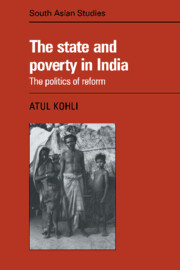Book contents
- Frontmatter
- Contents
- List of Tables and Figures
- Acknowledgements
- Introduction
- 1 The State and Redistributive Reforms
- 2 Democracy and Development in India: an Interpretation
- 3 West Bengal: Parliamentary Communism and Reform from above
- 4 Karnataka: Populism, Patronage, and Piecemeal Reform
- 5 Uttar Pradesh: Political Fragmentation, Middle-Peasant Dominance, and the Neglect of Reforms
- 6 Conclusion: The State and Reform in Democratic–Capitalist Development
- Appendix I On the Political Relevance of Social Classes in a Developmental Setting
- Appendix II Does Agriculture Growth Really “Trickle-down” in India?
- Bibliography
- Index
- CAMBRIDGE SOUTH ASIAN STUDIES
1 - The State and Redistributive Reforms
Published online by Cambridge University Press: 27 October 2009
- Frontmatter
- Contents
- List of Tables and Figures
- Acknowledgements
- Introduction
- 1 The State and Redistributive Reforms
- 2 Democracy and Development in India: an Interpretation
- 3 West Bengal: Parliamentary Communism and Reform from above
- 4 Karnataka: Populism, Patronage, and Piecemeal Reform
- 5 Uttar Pradesh: Political Fragmentation, Middle-Peasant Dominance, and the Neglect of Reforms
- 6 Conclusion: The State and Reform in Democratic–Capitalist Development
- Appendix I On the Political Relevance of Social Classes in a Developmental Setting
- Appendix II Does Agriculture Growth Really “Trickle-down” in India?
- Bibliography
- Index
- CAMBRIDGE SOUTH ASIAN STUDIES
Summary
This study analyzes the conditions under which public authorities of a developing society can effectively pursue redistributive reforms. Empirical investigation of politically directed socio-economic change requires a prior discussion of several conceptual and theoretical issues. How does one systematically think of political actors as constituting a potentially significant force capable of reforming civil society from above? The section to follow on the one hand, presents state institutions as not entirely determined or controlled by society, and on the other, delineates the factors enhancing or enforcing the state's autonomy from society. Also, how does one conceptualize variations in authority structures and relate these to varying capacities to pursue reforms? Some ideas are developed here by first considering the varying regime types governing developing capitalist states, and then by discussing specific arguments over the capacities of a democratic Third World regime for poverty reforms. By discussing these issues I hope to accomplish two theoretical tasks in this chapter: to develop a state-oriented frame of reference directing attention to the centrality of the state's role in economic development; and to derive some specific hypotheses that link democratic-regime types to redistributive outcomes and set the stage for the discussion of Indian empirical materials.
The State, State Autonomy, and Regimes
The concept of the state has re-emerged as a significant one in comparative political–sociological studies. If a few years back Alfred Stepan had trouble finding major writings discussing the state, today one could easily fill a shelf with books having the word “state” in their titles. As this study of Indian empirical materials is conceived to be a part of the ongoing reassessment in comparative politics, these intellectual trends are clearly welcome.
- Type
- Chapter
- Information
- The State and Poverty in India , pp. 15 - 50Publisher: Cambridge University PressPrint publication year: 1987



